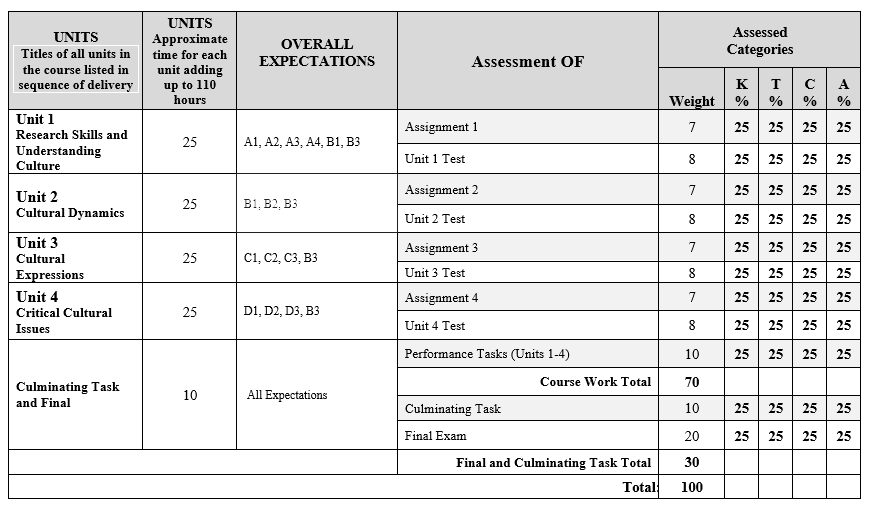Course Description
This course examines the nature of culture; how cultural identities are acquired, maintained, and transformed; and theories used to analyse cultures. Students will explore world cultures, with an emphasis on the analysis of religious and spiritual beliefs, art forms, and philosophy. They will study the contributions and influence of a range of cultural groups and will critically analyse issues facing ethnocultural groups within Canada and around the world. Students will develop and apply research skills and will design and implement a social action initiative relating to cultural diversity.
Course Code: HSC4M
Course Name: World Cultures
Department: Social Science and Humanities
Hours: 110
Credit Value: 1.0
Pre-requisites: Any university or university/college preparation course in social sciences and humanities, English, or Canadian and world studies.
Curriculum Policy Documents: The Ontario Curriculum, Grade 9 to 12, Social Science and Humanities, 2013 (Revised)
Growing Success: Assessment evaluation and Reporting in Ontario School, First Edition Covering Grade 1-12
Development Date: August 2019
Developed By: Jimmy Chia, B.A.(Hons), M.Ed. BEd. (OCT)
Teacher:
Revised By: NA
Revision Date: NA
Overall Curriculum Expectations
Course Content
| Unit | Unit Title | Approx. Duration |
| Unit 1 | Research Skills and Understanding Culture | 25 hours |
| Unit 2 | Cultural Dynamics | 25 hours |
| Unit 3 | Cultural Expressions | 25 hours |
| Unit 4 | Critical Cultural Issues | 25 hours |
| Culminating Task and Exam | 10 hours | |
| TOTAL | 110 hours | |
Unit Description
Teaching/Learning Strategies
- Research project
- Independent study
- Oral Presentations
- Debate
- Case summary
- Presentation
- Graphic Organizers
- Computer-Mediated Instruction
- Lectures
- Discussions
- Reading
- Pair Work
- Role Play
- Brainstorming
- Group work
Unit Organization

Assessment Strategies
| For Learning | As Learning | Of Learning |
|
|
|
Evaluation Strategies
Evaluation focuses on student’s achievement of the overall Expectations. Evaluation is basically collected from; observations, conversations, and student products.
Student Products include: tests, exams, rich performance tasks, projects, presentations and /or essays. Students submitting assignments that involved group work will be evaluated individually.
Before making a decision about a student’s final grade, the teacher will consider all the collected evidence of student products. The teacher will also consider that some evidence carries more weight than other evidence.
| Achievement Level | Percentage Mark Range |
| 4+ | 95-100 |
| 4 | 87-94 |
| 4- | 80-86 |
| 3+ | 77-79 |
| 3 | 73-76 |
| 3- | 70-72 |
| Achievement Level | Percentage Mark Range |
| 2+ | 67-69 |
| 2 | 63-66 |
| 2- | 60-62 |
| 1+ | 57-59 |
| 1 | 53-56 |
| 1- | 50-52 |
The final grade will be determines as follows:
- 70% Seventy percent of the grade will be based on evaluation conducted throughout the course.
- 30% Thirty per cent of the grade will be based on a final evaluation and the summative administered at or towards the end of the course.
Evaluation/Assessment Plan
| Unit | Unit Title | Approx. Duration | KICA % Application |
| Unit 1 | Research Skills and Understanding Culture | 25 hours | 25/25/25/25 |
| Unit 2 | Cultural Dynamics | 25 hours | 25/25/25/25 |
| Unit 3 | Cultural Expressions | 25 hours | 25/25/25/25 |
| Unit 4 | Critical Cultural Issues | 25 hours | 25/25/25/25 |
| Culminating Activities (ISU and Final Exam) | 10 hours | 25/25/25/25 | |
| TOTAL | 110 hours | ||
